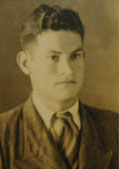by Rómulo Hernández
 Exhibición de Frida Kahlo
Exhibición de Frida Kahlo
Museum of Modern Art presents a major exhibition of stunning portraits & photographs of Frida Kahlo, providing an intimate look at her hauntingly evocative paintings and her revolutionary life. SFMOMA, 151 – 3rd St, SF @ Mission St. Special timed ticket required. Advance ticket purchase recommended. Info: www.sfmoma.org/kahlo. Sat. 14 June, show runs until Sept 28.
Concert: Elio Villafranca/John Santos Quartet
An engaging evening of Afro-Caribbean Jazz with Elio Villafranca/John Santos Quartet. They will present original compositions and standards with creative arrangements derived from the rich African Diaspora of Cuba and the Americas. Sunday June 29, 2008. $14 adv. $16 dr. – 7 p.m. At La Peña Cultural Center, Berkeley.
Queer Latino Arts Festival’s 1st Exhibition
The opening reception of Maria: Politics. Sex. Death. Men was on June 6th as part of the 10th Annual Queer Latino Arts Festival’s 1st Exhibition. Partipating Artists: Keith Aguiar, Robert Guzman, Allan Herrera, Jody Jock, Jonathan Solo, Ernesto Soprani and Leo Herrera. (*** ADULT CONTENT. PARENTAL DISCRECTION ADVISED). Curated by Leonardo Herrera was the winning proposal of a call to curators, and was selected from seven curatorial proposals submitted to a Review Panel composed by John Blanco (artist), Raquel de Anda (Curator), Carolina Ponce de León (Curator), Alberto Rangel (artist), and Rebeka Rodriguez (artist/educator). Exhibition Dates:Friday, June 6th – Friday, July 4th La Raza Gallery.
Summer School 2008 at MCCLA
Multicultural Arts Education For Youth Ages 7 – 17
- Session #1: June 23 – July 18.
- Session #2: July 21 – August 15.
- $185 each session.
- All fees are non-refundable.
- Mission Cultural Center for Latino Arts, 2868 Mission St, SF.
- Info at: www.missionculturalcenter.org.
Report ‘Return from El Salvador ’ in Berkeley
It is about the report that medical and university students from Merritt and Laney College offering and the Refugees’ Committee of Central Americans, about their experience giving out medical and school equipment at towns devastated by the civil war suffered in El Salvador. On Thursday, July 10 at 7 p.m. La Peña Cultural Center in Berkeley. (Donations are accepted).
LGBT FEST: “Alondra, A Transsexual Diary”
This documentary (Alondra: Historia de una transexual ) comes from Spain and approach the discrimination of a transsexual immigrant (Male to Female). co-presented by CUAV – Community United Against Violence and Programa para Trans-Latinas. Roxie Cinema: 3117 16th Street between Valencia and Guerrero. Rated: NR Runtime: 78 mins. Saturday, June 28, 5:00 p.m.
Celebrating the Day of Saint John in Roccapulco
A warm salsa night with Anthony Cruz will take place at Club Roccapulco on Saturday, the June 28, at 3140 Mission Street, SF. For more information call 415-648-6611.









